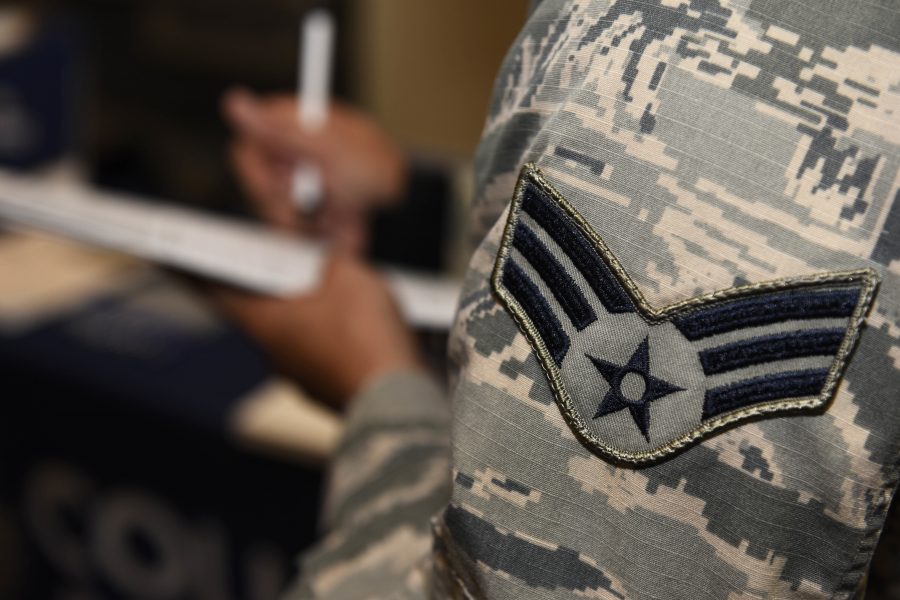Starting Oct. 1, the Department of the Air Force will only pay for $3,750 of college tuition for Airmen and space professionals each fiscal year, regardless of whether they’re engaged in undergraduate or graduate studies, a Sept. 29 release said. That’s an $750 per-fiscal-year decrease from fiscal 2020 reimbursement rates.
Troops facing extenuating circumstances are allowed to apply for waivers, and credit-hour limits aren’t changing, the release noted.
“Previously, military tuition assistance limits were $4,500 per fiscal year, but adjustments were required to ensure the program remains fully available and fiscally sustainable while meeting an increase in participation rates, the number of courses taken, and course costs,” the release stated.
The service told Air Force Times that it attributed the jump in participation to the COVID-19 pandemic, and that as of Sept. 24, 80,430 troops had taken advantage of the department’s tuition assistance program this fiscal year.
However, Chief Master Sergeant of the Air Force JoAnne S. Bass refuted that reasoning in a Sept. 30 Facebook comment on a thread concerning the change.
“While we know there has been an increase in Airmen going to online schools during COVID-19, that wasn’t a factor in the TA adjustments,” she said. “I would know, I was in the room where it happened.”
In an additional comment on the same thread, she noted that approximately 80 percent of the Department of the Air Force personnel who utilized its tuition assistance funds “last fiscal year used less than $3,750,” and that only about 20 percent of them actually hit the $4,500 cap.
“These new adjustments include exemptions to policy that are meant to mitigate the impact to that 20% as much as possible,” she wrote.
Bass also clarified that the decreased tuition assistance cap wasn’t the result of funds being reallocated. On the flip side, funding for this departmental resource was raised “to $168M this year (up ~$19M),” she wrote.
“Changing to $3,750 allows more Airmen to take advantage of the TA benefit,” she added.
Applications still will be routed via the Air Force Virtual Education Center web platform, and service members can apply for financial assistance “up to 45 days” before their class starts, the release stated.
The department anticipates the updated tuition assistance caps to help stretch out available funds in a fair manner; however, if the money earmarked for fiscal 2021 runs out “at year end,” troops whose applications haven’t yet been approved will have to reapply for tuition assistance once fiscal 2022 funds become available.
Air Force Deputy Chief of Staff for Manpower, Personnel, and Services Lt. Gen. Brian T. Kelly said in the release the change is intended to prevent history from repeating itself, noting that sequestration caused a temporary suspension of military tuition assistance in 2013.
He also underscored that military tuition assistance isn’t the only financial resource available to Airmen and space professionals who are trying to streamline costs while pursuing degrees.
“Air Force officials noted comparing school costs, researching other resources such as Post-9/11 GI Bill benefits, Defense Activity for Non-Traditional Education Support’s, or DANTES, subject standardized tests, or DSST, college-level examination programs, or CLEP, pursuing Community College of the Air Force degrees, and other funding sources such as scholarships and grants as parts of the overall education benefit that can help minimize expenses,” the release stated.
Service members are encouraged to reach out to their nearby education and training office and college counselors to search for more education funding sources, and to refer to “Air Force Instruction 36-2670 Total Force Development and Air Force guidance memorandum 2020-02” for more information about the policy change.
Editor’s Note: This story was updated on Sept. 30 at 9:22 p.m. EDT to reflect new comments from CMSAF Bass, and at 5:29 a.m. EDT to correct the updated military tuition assistance cap amount, as well as the decrease it reflects from the fiscal 2020 cap.
